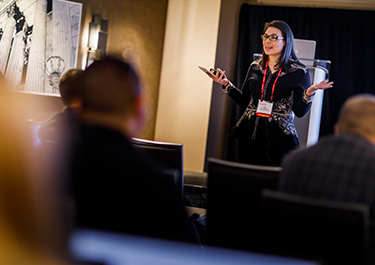 Early in March 2019, Women's History Month, Katherine Chaves, technical solutions professional, data and AI, Microsoft, stood in front of a class of Costa Rican high school girls about an upcoming Python coding course at Rocket Girls, the tech education non-profit she founded in 2018. After the presentation, one young woman in the classroom approached her. She explained to Chaves – a member of CompTIA’s Advancing Women in Technology Community – that she wanted to get into the program to help prove to her father, who believed that technology isn’t a space for women, that she could do it.
Early in March 2019, Women's History Month, Katherine Chaves, technical solutions professional, data and AI, Microsoft, stood in front of a class of Costa Rican high school girls about an upcoming Python coding course at Rocket Girls, the tech education non-profit she founded in 2018. After the presentation, one young woman in the classroom approached her. She explained to Chaves – a member of CompTIA’s Advancing Women in Technology Community – that she wanted to get into the program to help prove to her father, who believed that technology isn’t a space for women, that she could do it.
The high schooler’s story was not uncommon for Costa Rica, where technology remains a largely male-dominated field. But this is something Chaves is helping to change.
In the short time since Rocket Girls was founded, it’s already helped get absolute tech novices CompTIA certified and employment-ready. Along with outreach in schools, Rocket Girls posts content from women succeeding in technology on social channels like Instagram and Facebook to generate organic interest in this are once imagined to be off-limits.
“We want them to fall in love with technology based on the role models we’re putting out there,” Chaves said.
And Chaves is certainly a role model herself; her own career story is a thoroughly inspiring illustration of all that’s possible. Nowadays she’s touring Latin America as a tech evangelist, acting as a subject matter expert for the CompTIA Cloud Essentials certification. But only eight years ago, like the young woman who addressed her at the end of her presentation that day in March, Chaves was a tech novice.
Rocketing to the Top of Latin American IT
In 2012, when Chaves entered the Costa Rican IT workplace as a customer service rep at NetApp, acronyms like SSH and TCP/IP were almost an entirely foreign language to her. It was, in fact, her knowledge of another language, spoken rather than technical, that helped her get her foot in the door. In Costa Rica, the tech support economy supports Brazilian companies as well as English- and Spanish-speaking ones. Chaves, it so happened, was a language learner, conversationally proficient in Portuguese.Having spoken the language for only two years, she joined the customer support staff in a workplace staffed entirely by men, many of them with a decade or more of tech experience. It was a situation many might see as intimidating; but in any language, being intimidated is not in Chaves’ vocabulary.
“You have two ways to face a situation, right?” Chaves said. “You can be afraid of it and walk away and not learn or you can just say I’m a human, I’m here to learn, I’m wiling to help you but give me some extra time.”
Within a month, studying daily, asking questions and learning from those around her, Chaves was up to speed with her coworkers. By the time she was ready to move into a new role, she was working on structuring the technical training career path for the company.
Chaves’s next role was at VMWare. Hearing about the skills-enhancing, career-building capabilities of CompTIA certifications, getting certified became part of Chaves’ approach to boosting her knowledge. She got certified, building her skills in highly technical areas where she had no background, like machine virtualization, and moved to HP. By 2017, Chaves was tech-sophisticated and thrilled by the prospects of big data. She joined Microsoft in her current role in 2017 and brought with her a world of insights on what it takes to succeed.
“You have to be really resilient,” Chaves said. “For women, it’s tough. You’re always going to find people who help you to build your knowledge and help to guide you, but you’ve got to prove you’ll work twice as hard.”
As Chaves blazed a trail for women in the Costa Rican IT industry, she observed first-hand all of the challenges and disparities other tech aspirants would face; some social, some economic, some political – but all addressable.
IT Education: A Powerful Solution for Serious Problems
In Costa Rica, the majority of the people living in poverty are women. Traditional education is still understood as the primary path to success, but it can be prohibitively expensive and leave people in severe debt. Those who graduate enter a highly competitive workforce with few available jobs in their areas of study. At the same time, there are more than 7,000 open jobs in Costa Rica’s tech sector.
So, getting young women working in the tech world, building income, then moving into pricier educational pursuits when they’ve saved money is key, as Chaves sees it, not just to resolving the problem of debt, but the social pathologies that come along with it.
That’s the plan for Rocket Girls on the macro level. On a more individual one, Chaves’ hopes for the program are just as ambitious, and just as important. While she has found her peers throughout her career to be, in her own words, amazing, there’s an unavoidable fact; it gets lonely being the only woman. And it’s also a limiting factor on how far a company can go.
“I want people able to share different views; different ideas,” Chaves said. “I strongly believe that innovation comes from having women and men working together and proposing different things based on their experience.”
The Start of Something Big
In a hotel in Argentina, Chaves prepared for the workshops she would be teaching the following day. Microsoft often has Chaves traveling through Latin America, where she shows multinational customers how they can use the data solutions she’s passionate about to effectively pursue digital transformation.
Back home, the inaugural run of Rocket Girls, meanwhile, is already paying dividends. CompTIA-certified high school graduates from the program are already in positions at companies like Sykes and DHL. Some have even returned as mentors and teachers.
Rocket Girls is the start of something big both for women and for Costa Rica’s fledgling tech economy. And the wisdom Chaves has to offer, likewise, is good for women and good for everyone.
“We need to tell people – not only women – about how important it is to keep learning,” Chaves said. “Be curious. Always be able to learn something new. Always be eager to learn something new ... [Investment in tech job preparedness] changes the whole economy for the country. It means we can change people’s lifestyle.”
Learn about the Advancing Women in Technology Interest Group and CompTIA's Advancing Tech Talent and Diversity Community and get involved today!
Matthew Stern is a freelance writer based in Chicago who covers information technology, retail and various other topics and industries.

 Add CompTIA to your favorite RSS reader
Add CompTIA to your favorite RSS reader

